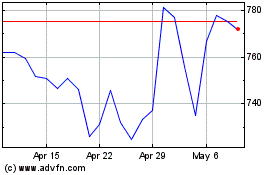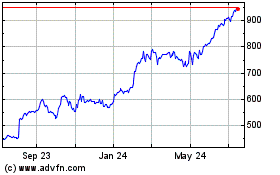By Preetika Rana
SUZHOU, China -- A new cancer drug licensed by Eli Lilly &
Co. was discovered by a six-year-old startup on the outskirts of
Shanghai, and derived from the ovary cells of Chinese hamsters.
Lilly now is planning to test it on Americans.
Rival Merck & Co. aims to test a separate cancer drug in the
U.S. this year, created by another startup near the border with
Hong Kong.
Those aren't outliers. China, long the world's supplier of cheap
pharmaceutical ingredients and copycat pills, is emerging as a
major producer of important new medicines: biotech drugs. China now
boasts the second-largest number of clinical trials involving
biologic treatments -- produced using biological matter such as
animal cells or bacteria -- after the U.S., according to data from
the National Institutes of Health.
The world's biggest drug companies have taken notice.
Merck sent executives to scour scores of Chinese startups, and
set up a dedicated innovation center in Shanghai in 2015. Johnson
& Johnson opened a similar center in Shanghai in 2014 to
identify scientific breakthroughs in China. In the past two years,
Lilly, Merck, Tesaro Inc. and Incyte Co. have signed
multimillion-dollar deals to sell China-discovered biotech drugs
overseas.
The tie-ups are a boost for China's ambition to shake off a
history of scandals, such as a 2008 incident when a blood thinner
called heparin -- made with Chinese ingredients -- killed dozens of
people in the U.S. alone. China is working to overcome a reputation
for poor quality to become an innovator and global producer of
complex products.
Will China transform "overnight? The answer is definitely no,"
said Olivier Charmeil, Sanofi SA's head of emerging markets. But
"when a direction has been set, it's clear that things happen," he
added, noting that China is devoting resources to ramp up
quality.
However, Chinese factories supplying chemical-drug ingredients
around the world continue to fail U.S. regulatory inspections. Last
year, the U.S. Food and Drug Administration barred ingredients from
a Chinese supplier that counts Sanofi, Pfizer Inc. and Novartis AG
as its customers.
Biologic drugs differ from chemical medicines and have
revolutionized treatment of diseases including cancer and diabetes.
They were developed by Western drugmakers in their own laboratories
for decades and are highly profitable -- accounting for eight out
of the world's top 10 best-selling drugs -- according to
consultancy Frost & Sullivan. But the drugs require more than
$1 billion each to develop and can take more than a decade to bring
to market, according to Pharmaceutical Research and Manufacturers
of America, a trade group.
Under pressure from a string of expensive failures and a
shrinking pool of patent-protected biotech drugs, global drugmakers
are increasingly turning outward to find new breakthroughs.
Enter China. As part of a push to transform the homegrown drug
industry, Beijing has thrown money and incentives at Chinese drug
manufacturers: One program lured back Chinese scientists working
overseas, billions of dollars were poured into technology parks
dedicated to biotech startups, and drug-testing approvals for new
biotech discoveries were speeded up.
Most Chinese startups began by making copies or tweaked versions
of existing biotech drugs, but some are advancing to the riskier
business of creating biologics that haven't been tested on humans
before.
Innovent Biologics Inc., the six-year-old startup near Shanghai,
struck the biggest deal to date for a Chinese drug firm in 2015,
when Lilly paid it $56 million to co-develop three cancer drugs,
including two discovered by Innovent. Innovent stands to earn more
than $1.4 billion over the next decade if the drugs meet
targets.
Inside a small Innovent lab in the industrial town of Suzhou,
dozens of cylindrical glass vessels called bioreactors brim with
cells derived from Chinese hamsters, rodents commonly used in
global medical research. The drug being designed, part of the Lilly
deal, is meant to block a gene hindering the body's ability to
fight cancer.
The process begins by genetically modifying hamster ovary cells
so that they produce an antibody -- or protein -- needed to block
the gene. The cells are then placed inside these bioreactors,
multiplying into billions of new cells over two weeks. The
resulting amber-colored liquid contains large quantities of the
antibody, the main ingredient in Innovent's drug.
One recent afternoon, researchers were running tests to check
the antibody for purity, color and consistency. "You have to get
every step right," said Innovent's founder, Michael Yu, inspecting
results on a screen. Finally, the antibody is packed into hundreds
of tiny vials and ready to be injected into patients.
Innovent has begun testing the drug on patients in China, while
Lilly is preparing an application to begin its own clinical trial
in the U.S. Once the drug is approved, Lilly says it plans to sell
it across the globe, except in China, where it holds joint
marketing rights with Innovent.
Clinical trials -- which involve testing the drug on hundreds of
patients over three phases -- can last over a decade in the U.S.,
and it is only after promising results that companies seek
regulatory approval.
Gaining drug approval in the U.S. makes it easier for companies
to sell products in several other countries without having to
conduct separate tests in each market. China requires its own
tests, though trials here are typically shorter and require fewer
patients than in the U.S., according to ChinaBio, a Shanghai-based
consultancy.
To be sure, not everyone is looking to license Chinese
discoveries. Amgen Inc. and MedImmune Inc., AstraZeneca PLC's
biotech arm, have formed joint ventures with local companies to
bring their own discoveries to China. Pfizer is building a plant to
sell copies of biotech drugs in China.
Nevertheless, China's biotech boom has attracted venture
capitalists, contributing to a record $5.3 billion being invested
in the country's life sciences sector last year, a nearly 10-fold
increase from five years ago, according to ChinaBio.
Lilly set up a venture-capital arm for Asia in 2008 and almost
all of its $500 million in investment since has gone to Chinese
biotech startups.
"China wasn't even on the radar 10 years ago," said Judith Li, a
partner at the fund. "Now it's impossible to ignore."
Write to Preetika Rana at preetika.rana@wsj.com
(END) Dow Jones Newswires
April 10, 2017 05:44 ET (09:44 GMT)
Copyright (c) 2017 Dow Jones & Company, Inc.
Eli Lilly (NYSE:LLY)
Historical Stock Chart
From Mar 2024 to Apr 2024

Eli Lilly (NYSE:LLY)
Historical Stock Chart
From Apr 2023 to Apr 2024
